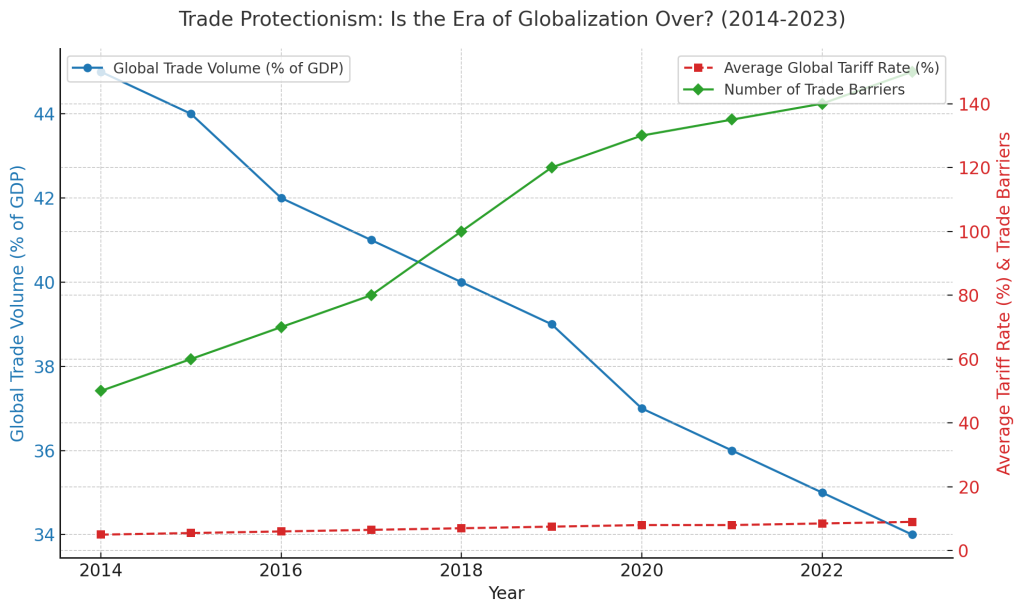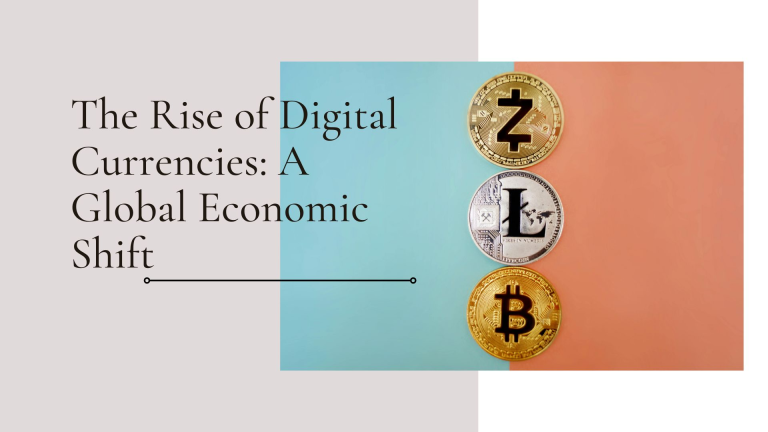Trade Protectionism: Is the Era of Globalization Over?
Globalization, the interconnectedness of countries through trade, investment, and technology, has shaped the world economy for decades. It brought a boom in international trade, opened new markets, and made products more affordable and available. But recently, a shift has occurred: countries are increasingly turning to trade protectionism. With tariffs, trade barriers, and "buy local" policies on the rise, many are wondering: Is the era of globalization over?
In this blog post, we'll explore what trade protectionism is, why it’s gaining ground, and what it means for the future of global trade

What Is Trade Protectionism?
Trade protectionism refers to policies that governments put in place to protect their domestic industries from foreign competition. These policies often include:
- Tariffs: Taxes placed on imported goods to make them more expensive compared to locally produced goods.
- Quotas: Limits on the number of certain foreign products that can be imported.
- Subsidies: Financial support provided by governments to local industries to make them more competitive.
- Regulations: Rules or standards that make it harder for foreign goods to enter the market.
The idea behind protectionism is to boost domestic industries by making foreign goods less attractive or more costly. But while this may help local businesses in the short term, it can also lead to unintended consequences.
Why Is Trade Protectionism on the Rise?
Several factors have contributed to the resurgence of protectionist policies in recent years:
- Economic Nationalism
There’s been a growing sentiment in many countries to prioritize national interests over international cooperation. This has led to policies that favor local businesses and workers, often at the expense of foreign competitors. “Make America Great Again” and “Brexit” are examples of movements driven by a desire to reassert control over trade and economy. - Job Protection
One of the main arguments for protectionism is the need to protect jobs. Some industries, especially manufacturing, have been heavily impacted by cheaper labor in other countries. Governments, hoping to bring jobs back home, implement trade barriers to reduce dependency on imports. - Trade Deficits
Many countries have large trade deficits, meaning they import more than they export. Protectionism is often seen as a way to reduce these deficits by encouraging the consumption of local products rather than relying on foreign goods. - Geopolitical Tensions
Trade protectionism is sometimes used as a tool during political conflicts. For example, the U.S. and China have engaged in a trade war, imposing tariffs on each other’s goods as part of a broader dispute over economic policies and power dynamics.
The Impact of Protectionism on Globalization
The rise in protectionism has sparked concerns about the future of globalization. For decades, globalization allowed for the free flow of goods, services, and investments across borders, leading to lower costs and more choices for consumers. However, the current trend toward closing off economies could reverse some of these gains. Here’s how:
- Higher Prices for Consumers
When countries impose tariffs on imported goods, prices for those goods often rise. This means consumers may have to pay more for everyday items like electronics, clothing, and food, which were previously cheaper thanks to international trade. - Reduced Product Availability
With quotas or regulations limiting the number of foreign goods allowed into a country, consumers may have fewer choices. For example, a country might limit imports of certain cars or technology, making it harder to access a variety of products. - Disrupted Global Supply Chains
Many products today are made from parts sourced from all over the world. A smartphone, for instance, may have components from Asia, Europe, and the U.S. Protectionist policies can disrupt these global supply chains, leading to delays and higher costs for companies, which often pass those costs on to consumers. - Retaliation from Other Countries
When one country imposes tariffs or barriers, other countries often respond by doing the same. This can lead to a tit-for-tat escalation that hurts both economies, reducing trade and damaging industries that rely on exports.
Is Globalization Really Over?
While protectionism is making headlines, it’s unlikely that globalization is truly over. The global economy is deeply interconnected, and many industries still depend on international trade to thrive. However, what we’re seeing is a shift in how globalization functions. Countries may increasingly focus on regional trade agreements rather than global ones, relying more on trade within neighboring regions. This could lead to new alliances and partnerships that reshape the global economy without completely dismantling it.
What Does This Mean for You?
As protectionism rises, everyday consumers might notice higher prices for imported goods or reduced availability of certain products. However, there could also be more support for locally made goods, encouraging people to buy from domestic businesses. For those in industries like manufacturing or agriculture, protectionist policies could create new opportunities for jobs and growth in local markets, but they might also face challenges in exporting their products to international markets if other countries retaliate with their own trade barriers.
Conclusion
Trade protectionism is gaining momentum, but that doesn’t necessarily mean globalization is over. Instead, we may be entering a new phase where trade becomes more regionalized, and countries focus more on protecting their own economies. The impact of these changes will vary depending on where you live and the products you rely on, but it’s clear that the global economic landscape is shifting. As consumers and investors, it’s important to stay informed about these trends, as they can directly affect everything from the prices we pay at the store to the health of the economy overall. So, while globalization may not be entirely over, it’s certainly evolving—and we’re all a part of this new chapter.


